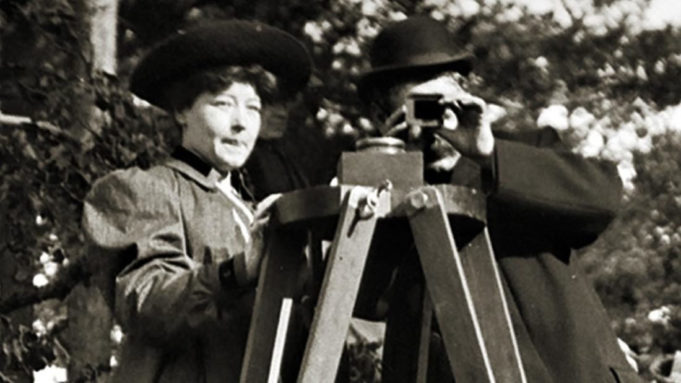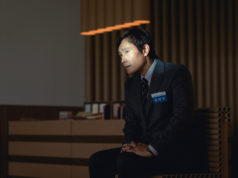On March 22, 1895, Auguste and Louis Lumière held a private screening in Paris of a film they made of workers leaving their factory. This event, which had some 200 spectators, is often considered to be the first-ever demonstration of projected film in history and the birth of cinema itself. Most histories of film mention the Lumière brothers as well as Georges Meliès, the stage magician who attended their first public screening in December 1895 and became a filmmaker himself.
The name you will not find, unless the history you’re reading is fairly recent, is that of Alice Guy-Blaché. An assistant to industrialist Léon Gaumont, she attended that first screening in March 1895, and by the next year, she was operating the camera and writing for her own short films. Where the Lumières used film to capture an environment as faithfully as possible and Meliès aimed to bring impossible visions to life, Guy-Blaché’s films focused on character development. The title of “director” did not exist yet, but Guy-Blaché has a decent claim to being the first woman to direct movies. Her story illustrates that women have been making films since the beginning of the artform.
Even though women have and continue to be denied filmmaking opportunities both in Hollywood and all over the world, detailing the history of women in film would require far more space than this article can afford. We’ll mark International Women’s Day by trying anyway.
The early history of cinema included Helen Gardner, a silent-film star who’s regarded as the first actor (either male or female) to found her own production company, while comedian Mabel Normand was among the first women to step behind the camera and direct, including the short film in which Charlie Chaplin created his Little Tramp persona. A protegée of Guy-Blaché’s, Lois Weber was likely the very first American woman film director, and while she rewarded her mentor by stealing away her husband, her films tackled difficult subjects such as abortion, poverty, and birth control. She also included nudity in her films and staged one of the first car chases on celluloid.
Of course, women directors have never automatically led to progressive politics, as Leni Riefenstahl glorified Hitler’s reign in her 1935 Nazi propaganda documentary The Triumph of the Will. Distasteful as that is, she can’t be ignored because of her technical talent — her documentary about the 1936 Olympics, Olympia, pioneered filming techniques that you can still see on TV sports today.
Ironically, she worked at the same time as Leontine Sagan, whose 1931 film Mädchen in Uniform was among the first to depict homosexuality. Over in America, the openly gay Dorothy Arzner spent more than a decade as Hollywood’s only female director. That streak was broken when red-haired actress Ida Lupino took over directing duties on a thriller called Not Wanted after director Elmer Clifton suffered a heart attack during his first day on the set. She would go on to a distinguished career directing psychologically keen noir thrillers that took on rape (Outrage) and polygamy (The Bigamist), and her 1953 serial killer film The Hitch-Hiker is considered a classic.
Second-wave feminism created a surge of filmmakers around the world, with experimental filmmakers like Lizzie Borden, whose Working Girls viewed sex workers without stigmatizing them and whose Born in Flames depicted queer and interracial sexuality via proto-rap music and other postmodern devices. Kinuyo Tanaka, the lead actress of several of Kenji Mizoguchi’s films, parlayed her fame into a career behind the camera in Japan, while Agnès Varda joined the French New Wave (starting her directing career late after trying to become a photographer) and explored the lives of people on the margins of society through documentaries and features.
I came up at a time when women directors were active (Barbra Streisand, Chantal Akerman, Claire Denis), yet their efforts were scarce enough that critics would take an attitude of “Oh, look at that!” whenever they reviewed a film by a woman. That’s no longer the case, and I find a new crop of female directors every year when I write up my annual feature of best debut filmmakers. French cinema, perhaps the one culture that can rival America’s cinematic output, has experienced a resurgence because homegrown talent such as Céline Sciamma and Julie Delpy and transplants such as Danish immigrant Mia Hansen-Løve and Senegalese immigrant Mati Diop are now directing films. Women filmmakers have even made their presence felt in such inhospitable environments as Saudi Arabia (Haifaa al-Mansour) and Iran (Samira and Hana Makhmalbaf). The world of women-directed films is now too large to summarize, as it encompasses both Kathryn Bigelow’s Oscar-winning war film The Hurt Locker and Greta Gerwig’s Barbie, the first movie directed by a woman to be its year’s top box-office earner. On a week-to-week basis, their films are making moviegoing a more interesting experience.
Read about upcoming events for women or by women in Night & Day.












